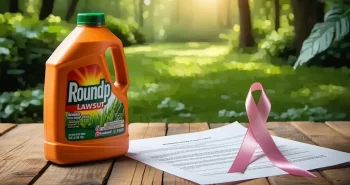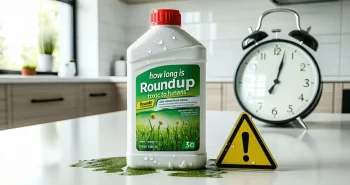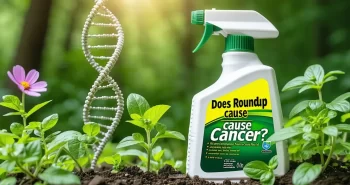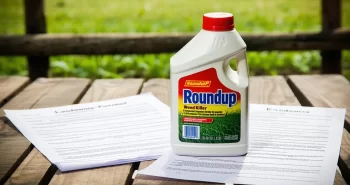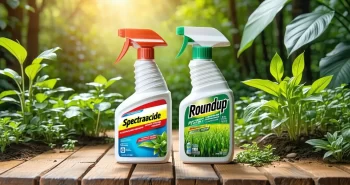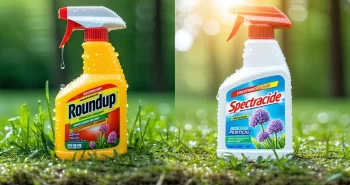Legal Rights After Roundup Exposure in 2025

Does Roundup still contain glyphosate? If you’ve used Roundup and are concerned about glyphosate exposure, this page explains who may qualify for legal action. Reported cases show some users have experienced health issues, and lawsuits are ongoing. This information is for potential claimants exploring their legal options, not medical advice.
Now, if you’ve ever pondered the idea of giving those Roundup folks a piece of your mind in court, knowing what’s inside counts double. Being clued-in about what you’re dealing with isn’t just about staying safe, it’s also about being prepared if you’ve got a legal battle on your hands. Curious about the ropes of Roundup lawsuits? Legal Claim Assistant has the scoop on how to seek compensation if Roundup’s shenanigans have caused you grief.
Table of Contents:
Reported Glyphosate Complaints and Legal Cases
So, here’s the scoop: I’ve been a Roundup user myself, and let me tell you, it’s kind of a big deal to know what you’re splashing around. Glyphosate is the active stuff in Roundup, a favorite in the world of weedkillers, but it’s got folks talking these days. Why? Well, it’s got some folks worried about how it might affect our health and the planet.
Legal Background: Roundup Exposure Claims
Picture it: the 1970s. Monsanto rolls out this broad-range weed slayer, glyphosate. How it works? Knocks out an enzyme that plants need to survive. Effective? Yes. But safe for us humans? That’s where it gets murky.
You’ve got studies ringing the bell on potential health concerns with glyphosate exposure, and let’s just say it’s not easy bedtime reading. The International Agency for Research on Cancer (IARC) under the WHO umbrella gave glyphosate a not-so-glowing review, tagging it as “probably cancer-causing to people” based on animal studies.
If you’ve been using Roundup and things have gone sideways health-wise, there might be a legal route for you to knock on. Legal Claim Assistant is here to walk you through the process, potentially aiming for compensation if glyphosate exposure has caused you harm.
Know the backstory on glyphosate and its health baggage if Roundup has put you in a pickle. Protect yourself and make moves to get the help and justice you’re owed.
Did Monsanto or Bayer Remove Glyphosate?
Let’s dig into whether glyphosate has been swapped out in Roundup by Monsanto or Bayer. We’ll look at how the product recipe has morphed over the years. These changes reveal just how much glyphosate has stuck around or been shown the door in Roundup.
Evolution of Product Formulation
| Year | Roundup Recipe | Glyphosate Content |
|---|---|---|
| 1990s | Original Roundup Formula | High Levels |
| 2000s | Tweaked Formulas | Still there, just varying amounts |
| 2010s | More Tweaks | Mostly keeping glyphosate in the mix |
| 2025 | Today’s Recipe | Glyphosate varies depending on the product |
Monsanto and Bayer have tweaked the formula here and there—mostly to keep regulators happy and address what’s on your mind. But all in all, glyphosate has pretty much stayed a reliable pal in most Roundup products.
Getting the lowdown on how Roundup’s formula has evolved over time helps anyone curious about how persistent—and maybe dodgy—this herbicide is in their trusty weed killer. If you want a detailed look-see on glyphosate’s safety record and any scary health concerns, roam over to our piece on how much exposure to Roundup is dangerous.
By piecing together glyphosate’s backstory in Roundup and keeping up with the latest product tweaks, you’re better equipped to understand what’s in your garden tool kit and what it means for your health and well-being.
Which Roundup Products Still Contain Glyphosate?
2025 Labeling and Ingredient Info
I’m here to chat about something that might be growing in your garden, but hopefully not in your health concerns—Roundup! You know, that stuff we use to tackle weeds. Well, we’re having a look at whether or not this stuff still has glyphosate in 2025. Glyphosate has stirred up quite the fuss over the years, and it’s important to know what’s in the products you might be using.
To clear things up on this topic, let’s take a peek at what those Roundup labels are telling us in 2025:
| Roundup Product | Glyphosate Content | 2025 Labeling Information |
|---|---|---|
| Roundup Original | High | Shouts loud and clear: “Contains glyphosate!” |
| Roundup Concentrate | Variable | Spells out the glyphosate levels, so you know what’s what |
| Roundup Ready-to-Use | Low | Peeks out on the label that it’s got some glyphosate |
Now, by checking out what’s listed, you’ll know if that Roundup you’re thinking about still packs some glyphosate punch. Knowing whether it’s hanging around is important, especially if you’re worried about what it might mean for health and safety.
Oh, and before you go, if you’re curious about how much exposure to this stuff might be dangerous, you can check out our thoughtful piece on how much exposure to roundup is dangerous. Keeping yourself in the loop on your garden supplies means making those wise, health-conscious decisions, doesn’t it?
Legal Implications of Different Roundup Formulations
Comparing Old and New Roundup Products
So, you’re wondering if ditching glyphosate makes Roundup safer, huh? Let’s take a good look at how these new formulas stack up against the old-school ones.
What’s the Buzz About?
| Criteria | Old-School Roundup (with Glyphosate) | New Wave Roundup (Glyphosate-Free) |
|---|---|---|
| Active Ingredients | Glyphosate, often under fire for health concerns | Usually something natural-ish, but still need a closer look |
| How They Work | Zaps weeds by messing with plant enzymes’ works | Finds sneakier ways to derail weeds, like stopping seeds from sprouting |
| Impact on Mother Nature | Possible glyphosate runoff mucking up soil and water | Developers claim it’s gentler on the planet, with faster breakdown |
| What the Law Says | Strict checks on glyphosate levels | Different set of hoops to jump through for safety checks |
These newer, glyphosate-free options claim a few upsides, especially in scrubbin’ out glyphosate from your life. But hey, does it really tackle weeds like a pro? Will it still do the job without being a sneaky danger on its own? Not always clear-cut.
Used Roundup lately and feeling iffy? It’s not a bad idea to chat with your doc, even if it’s just for peace of mind. Concerned about chemicals? See what to do if you’ve had a run-in with glyphosate in our guide on next steps.
Bottom Line
These glyphosate-free versions? They’re an option if cutting back on glyphosate makes you sleep better, but it’s key to weigh up how effective and safe they are side-by-side with the older stuff. Knowing the ins and outs of both lets you pick the weed killer that gels with your health goals and love for the Earth.
Ongoing Lawsuits Related to Glyphosate Exposure
In 2025, the chatter about glyphosate, the key ingredient in the weed killer Roundup, and its cancer connections isn’t dying down. Lawsuits and research are still fanning the flames of whether this stuff is a health hazard or not.
Lawsuits and Scientific Evidence
Lawsuits keep popping up left and right against Roundup’s makers thanks to claims that glyphosate exposure led to various cancers, like non-Hodgkin’s lymphoma. People say using Roundup as a weed killer did more harm than good. The court battles hinge on scientific evidence trying to nail down if there’s a real link between glyphosate and cancer.
Research on glyphosate and cancer has turned up some mixed results. Some studies point fingers at glyphosate, linking it to cancers like lymphoma, while others aren’t so sure. Scientists are still hashing out whether glyphosate is truly bad news for our health.
If Roundup has thrown your health for a loop and you’re mulling over legal action, getting in touch with a lawyer is a no-brainer. Lawsuits could offer a financial helping hand if glyphosate exposure has taken a toll on you. More on this can be found in our piece about gathering proof for a Roundup lawsuit here.
The legal battles and scientific inquiries around glyphosate put a spotlight on its potential health risks, stirring up the debate. If you’ve been using Roundup and are now dealing with nasty health issues, it’s time to get some advice and see what legal options are on the table for you.
Legal Considerations and Regulatory Notices
When we’re talking about glyphosate and its safety, we can’t ignore the views of those in the know – the ones who keep an eye on this stuff, the big agencies around the globe. You’ve got the Environmental Protection Agency (EPA), the World Health Organization (WHO), tossing in their warnings and reviews like a hot potato game.
EPA, WHO, and International Warnings
Let’s chat about the EPA first. They’re the folks who decide what’s safe in the U.S. For years, they’ve been diving into heaps of glyphosate data. Back in ’93, they said glyphosate wasn’t likely to cause cancer in folks. Fast forward to 2015, their tune was more or less the same – not a carcinogen, at least not in doses that matter health-wise. But peace of mind isn’t on the menu just yet; they keep dissecting fresh data to make sure.
Now, the WHO’s International Agency for Research on Cancer, or IARC for short, they flipped the script in 2015. They went, “Hey, this thing’s a probable carcinogen!” Yup, that stirred up quite the debate among science nerds. Fact is, they were talking about potential harm, not a certain ticket to cancer town.
And on a global scale? Agencies can’t quite agree on where they stand with glyphosate. Some countries are waving the ban flag, while others let it ride but watch it closely with regs and restrictions. It’s all a tad messy – a clear sign we need endless research and rules tweaking.
In the midst of all this back-and-forth, it’s good to be clued in on what these big-dogs say. If you’re someone who’s been around glyphosate and feeling a bit anxious, it makes sense. Stick to the news for any latest findings and definitely chat with the doctor if worries keep you up at night. Oh, and for a rundown on cancers linked to glyphosate, you might swing by our piece on roundup cancer types.
Is the Roundup Risk Still Relevant Today?
So here we are, still scratching our heads asking why lawsuits keep popping up around Roundup weedkiller. Let me break it down for you—there’s a reason folks can’t stop talking about it and taking legal action.
Why Lawsuits Are Still Being Filed
It’s pretty simple, really—health worries are not going away anytime soon. Even though the makers of Roundup have tried tweaking their products and how they market them, people are still finding themselves in a tough spot. They’ve been out there using Roundup, getting exposed to glyphosate, and then facing some scary health stuff. So, they’re looking for justice through the courts.
The big issue? The scary word “cancer.” There’s this ongoing debate and suspicion that reaching for Roundup might lead some people down that road due to glyphosate exposure. Science keeps digging deeper, and as everyone gets more clued in, the need for fixing these troubles stays strong for those affected.
Trying to untangle these Roundup lawsuit matters can feel like going down a rabbit hole. But it’s all about peeling back the layers to understand why these legal battles are still raging. Once you get the full picture, it can open up a path towards finding resolution and maybe even some peace for those who’ve been caught up in it all.
And if you’re curious about whether there’s a real link between Roundup and cancer, our article on does Roundup cause cancer goes into detail. Knowing what the science says about these lawsuits can be a game-changer for folks needing a bit of guidance.
As we keep seeking fairness and answers, staying up-to-date about these Roundup lawsuits is critical. By understanding why these lawsuits won’t disappear, anyone affected by glyphosate can better chart their course for justice.
What If You Used Roundup Recently?
Steps to Take If You’ve Been Exposed
So, you’ve been out there, tackling those pesky weeds with Roundup like a pro. But now, you’re worried about what happens next. Dealing with possible glyphosate exposure can be nerve-wracking, given the worries linked to serious health concerns, including certain cancers. Don’t sweat it—we’ve got some steps to help ease your mind and plan the way forward.
Steps to Take If You’ve Been Exposed to Roundup:
| Step | Action |
|---|---|
| 1. | See a Doctor Quick: If you suspect you’ve been around a bit too much glyphosate while using Roundup, it’s time to visit your healthcare provider. They can check things out and you can lay all your cards on the table—how you came into contact with it and any odd feelings or symptoms you’re noticing. |
| 2. | Get Your Note-Taking Hat On: Jot down everything you can think of about using Roundup: when you used it, how long you were exposed, and what gear you wore (if any). This could come in handy later if you decide to go the legal route. |
| 3. | Watch Your Health Like a Hawk: Be on the lookout for any weird symptoms after using Roundup. Things like itchy skin, coughing or breathing trouble, or stomach issues are a red flag. Better to catch these early. |
| 4. | Think About Legal Help: If you suspect that glyphosate exposure’s behind any health issues you’re facing, you might be eligible for some cash back through a lawsuit. A legal advisor can clue you in on your options and help you get the ball rolling. |
Taking the right steps when you think you’ve been exposed to glyphosate can make a world of difference in looking after yourself. Whether your concerns are about health issues creeping up or you’re looking into your legal rights, acting promptly is where it’s at. You’re not flying solo here; there’s plenty of help to guide you through this maze of risks and rights tied to glyphosate exposure. Remember, it’s important to look after number one—your health and peace of mind matter the most.
File a Claim With Legal Claim Assistant If You’ve Been Exposed to Glyphosate
Hey there, if you’ve found yourself dealing with health issues after using Roundup, you’re probably wondering what to do next. Well, there’s hope. Legal Claim Assistant is here to help folks just like you who have been affected by glyphosate—yep, the main ingredient that makes up Roundup. If you’re hitting some roadblocks health-wise, you might be in line to get some cash back for your troubles.
Let’s break it down step-by-step and see how you can get the ball rolling:
| Here’s Your Game Plan to File a Claim with Legal Claim Assistant |
|---|
| 1. Give Legal Claim Assistant a Ring and Chat About Your Case |
| 2. Share the Details of Your Glyphosate Exposure and Any Health Troubles |
| 3. Legal Claim Assistant Will Check Out Your Case and Give Advice on Next Moves |
| 4. Team Up with Legal Claim Assistant to Get Your Claim Rolling for Compensation |
| 5. Count on Legal Claim Assistant to Stick by You Through the Legal Shootout |
Getting your claim on file with Legal Claim Assistant can arm you with the backup and know-how to wade through the legal maze that comes with glyphosate exposure. Don’t sit on it—timing’s a big deal if you think glyphosate’s impacted your health. There might be a countdown on filing your claim, so better to ask sooner rather than later. If you want the scoop on whether you qualify and how all this legal stuff works, hit up Legal Claim Assistant. They’ll have your back every step of the way.

